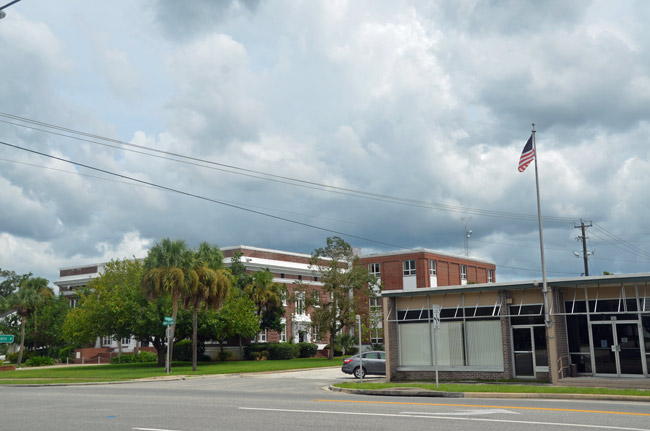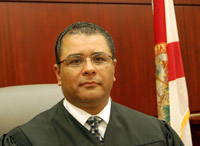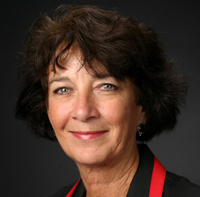
It doesn’t sound like securing a place for estranged parents to exchange their children during custody hand-overs, or for visitations, would be a big deal. But to many families, particularly victims of domestic violence, it’s a very big, very delicate, sometimes dangerous deal. Emotions are raw. Absent controls and proper security, respective parents can get angry. Physical abuse and other forms of violence are the reason they’ve been separated, after all. They can get violent again, and sometimes do.
There’s no place where they can conduct those exchanges in Flagler County. The alternative is Daytona Beach or DeLand, where there are safe harbors set up precisely for those exchanges and visitations, with trained staff. But not all families can afford the trip, or the time. So judges in Flagler have reverted to the strangest alternatives, from Walmart’s property at one time, because it has security cameras, to Walmart’s parking lot, to the flagpole in front of the Flagler County Courthouse, where the parents must go through a whole choreography of safety measures to keep them at a distance.
That may be about to end. Members of the Flagler County Safety Coordinating Council and others have secured a three-year, $400,000 federal grant that would enable the opening of just such a safe harbor, likely in Bunnell, by next year.
Its importance to families, and to judges, cannot be understated. Nor can the way key people in local government can seize on an issue, find a solution and make it happen. The key players in this case are Circuit Judge Raul Zambrano, County Judge Sharon Atack, County Commission Chairman Barbara Revels, Deputy County Administrator Sally Sherman, and outside of government, the Children’s Home Society’s Christine Davenport—who found the grant—and Abby Romaine, who was its administrator, before she had to resign and do the work as a volunteer to comply with a federal law barring her from working on a federally-paid job while running for office. She is an independent candidate for the Flagler County Commission this November.
“We have had an increase in incidents of domestic violence in the county and many of the cases can be attributed to the hard economic times,” Romaine said. “With an increase in the population you’re going to see an increase in domestic violence, but no real resources during the time of separation. There’s a heightened risk of violence during the period of separation, because the abuser is losing that power and control over his victim. And yet the court often orders visitation, and children want to see their abuser parent, and want to have that connection, but there’s no mechanism to make it happen.”
Let Flagler County Circuit Judge Raul Zambarno tell the story.

“When I first started here at the old courthouse,” he said during a break in the Safe Haven Center committee’s work late last month, “I had a case involving a woman by the name of Brittney Trivett. Brittney had some psychological issues, going through a divorce, and as part of the divorce she wanted to see her children. It got to the point that nobody really wanted to supervise her visitations. These folks had money, but yet it was difficult to get them to supervise a visitation. She became medicated at some point in time. She was stable enough, I remember, it was the day before Thanksgiving. The day before Thanksgiving she wants to see her children. Nobody wants to take her. So my bailiff decided to go ahead and supervise the visitation on Thanksgiving day at her house. So Brittney went and had this visitation at the bailiff’s house, in essence, and she was doing this completely on her own. It’s a mother, she needs to see her children, that’s important. And it happened, everything went fine.”
This was all before 2007. Zambrano continued: “Not too long thereafter, Brittney Trivett died of a drug overdose, and all I could think of was, you know, at least she got to see her kids. That was important. And I realized Flagler County has grown so big, and we’ve had so many of these cases where people want to see their kids but we can’t have a safe place to exchange their kids. Walmart people don’t like it when you do it in their lobby. We used to do it there because there are cameras. Then they’re big into relaxing their rules, they start exchanging them in the parking lot. They start yelling at each other in the parking lot.”
The sheriff’s office didn’t like it because they didn’t staff their lobbies on the weekend. In one case in West Florida, Zambrano recalled, an exchange took place in a police lobby that wasn’t staffed, emotions went out of control, and a person was killed. In front of children.
“So we resorted here to what we had,” Zambrano said, “and that was the lobby of the courthouse, or the flagpole after hours, and we would angle our security cameras on the flagpole. We would have one parent park on the west side parking lot, one set of parents park in the east side of the parking lot, walk to the flagpole and exchange it there. But even that’s not ideal, and you know, to be honest with you, I’ve seen exchanges, because sometimes I can watch through the glass, and it’s just not good for kids, not good for kids to have to go through that—really impersonal exchanges.”
And in many cases the children themselves don’t have anyone to act as a mediator. “So as a judge you get caught in a bind. You grant that injunction, you tell parents don’t talk to each other, don’t see each other, but now they have to exchange the kids. How do they do that? So this is what I brought to the safety council. I just mentioned it as a story.”
And in the audience, there was Christine Davenport of the Children’s Home Society, which runs just such safe havens in Volusia County. Soon after, she emailed Revels, the county commissioner. Revels and Sherman, the deputy administrator, took the idea and ran with it.
Absent obstacles, the safe haven would open sometime next year in the section of the building adjacent to the Flagler County library’s Bunnell Branch, across the street from the old courthouse. The property is owned by the county.

“The scope is very narrow,” Revels said of the grant. “It has to relate to violence against women and children. So there are a bunch of other services that the Children’s Home Society does, there are visitation centers in Daytona like for a parent trying to establish their parental rights maybe, they’ve gotten out of jail or whatever, the judge makes them go have supervised visits, and they record them and they assess them and they interview the child, then they give a report to the judge. They do those things, but that wouldn’t be allowed under this grant because it wasn’t related to domestic violence. However we want to be able to offer all those things as ancillary services, but we’ll have to be able to find a way to divide up the cost of doing that separate from the grant.”
The grant is strictly crafted, too. There had to be a one-year planning, the team had to go to a one-week long training in Texas, the committee had to go through the policy-writing, line by line—that’s what they were doing on Aug. 29, down to debating whether to use the word “attorney” (Zambrano’s favored word) as opposed to “lawyer”) and the Department of Justice has to approve it all, including the policies adopted and the location.
Some 40 families would be directly affected by the availability of the center in any given year, more if the center is able to grow beyond its federal scope.

“The hope would be that it would heal families faster, give families another resource to have safe exchanges, to visit their children more, people that aren’t seeing their children because the judge can’t send them to a safe place to see their child,” Revels said.
Romaine, who originally administered the grant—with Flagler County government acting as the sponsor—was doing so on a $30,000 annualized salary from the grant, but gave it up when she announced her run for the commission. She’s continuing to do the same work as a volunteer.
“I got involved because they needed a coordinator, someone to put it all together keep all the pieces in motion—the point person for the federal government,” Romaine said. “And I have a unique skill set. My dissertation research is on domestic violence.” Romaine is a doctoral candidate in anthropology at the University of Pennsylvania (she’s ABD, the acronym for “all-but-dissertation).
Once the federal Office of Violence Against Women approves the Bunnell site, including its safety measures, Safe Haven Center can move from its document phase to a reality.





























pamala zill says
Oh..so Truly good. Smart, deep, real and so absolutely. Necessary. And essential. GREAT!!!!
Will says
A very worthy goal for a problem I didn’t know existed.
And, kudos to all who are making it happen – especially to County Chair Revels, and to Ms. Romaine who’s continuing the work as a volunteer. That’s impressive for a county commissioner candidate.
Outsider says
So we’re going to spend nearly half a million dollars of taxpayer money so parents can swap their kids out. How exactly will this money be spent, or more precisely, who’s going to get it? I find it hard to believe that a federally funded program is the only viable solution for a problem that only affects a few, but give a liberal some “federal” funding and they’ll find a way to waste it.
Sally says
@outsider I really do not see using GRANT MONEY to prevent a child witnessing their mom or dad getting verbally or physically abused as a waste of money. You are obviously ignorant to the issue.
Outsider says
Sally, what do you think, “GRANT MONEY” grows on trees? Four hundred thousand dollars for 40 families comes out to ten thousand dollars per family. What about the dire financial situation this country is in. Frankly, I’m tired of paying for other people’s screw ups. Surely there’s a more cost effective solution than this. But as I said, let a liberal manufacture a problem, convince someone to give them some “federal money,” and they’ve got themself a job.
Sally says
@ outsider well yes I agree with you on the point that grant money does not grow on trees but you and I both know this government was not going to put it into our pockets. Also, children do not pick their parents, and yes I personally know screw ups that do not deserve the aid they get especially when they screwed up when the economy was booming. I do not like the fact that I have to pay for their free ride either as I get up and go to work every day and still struggle.